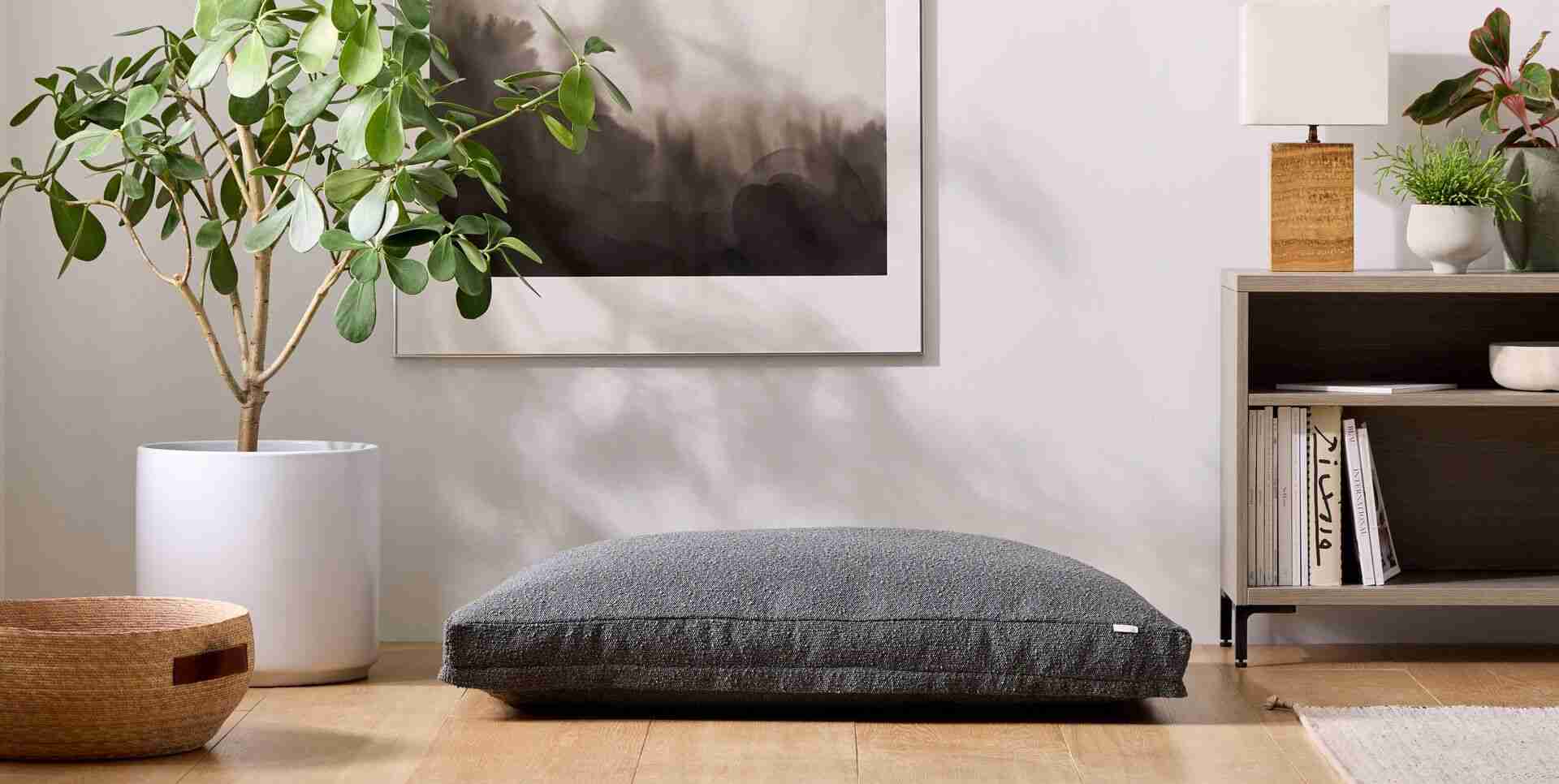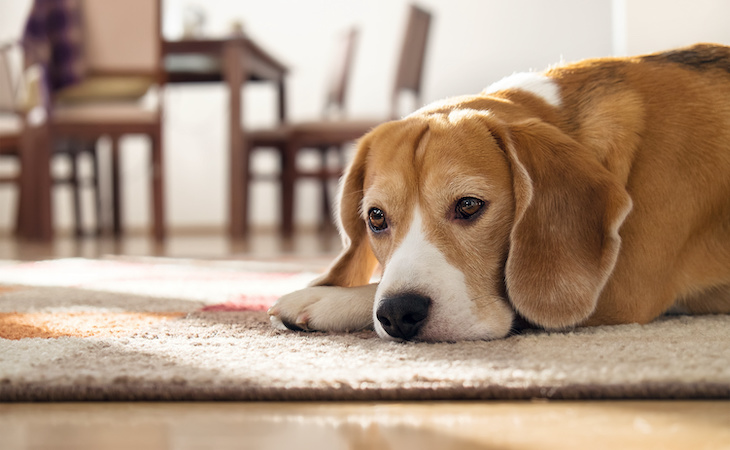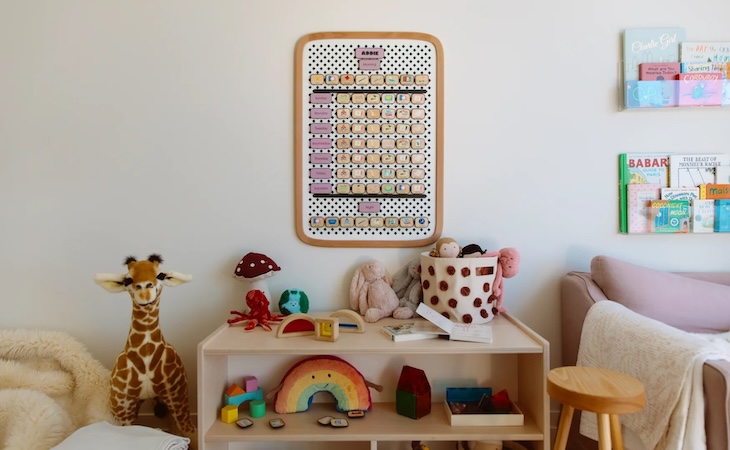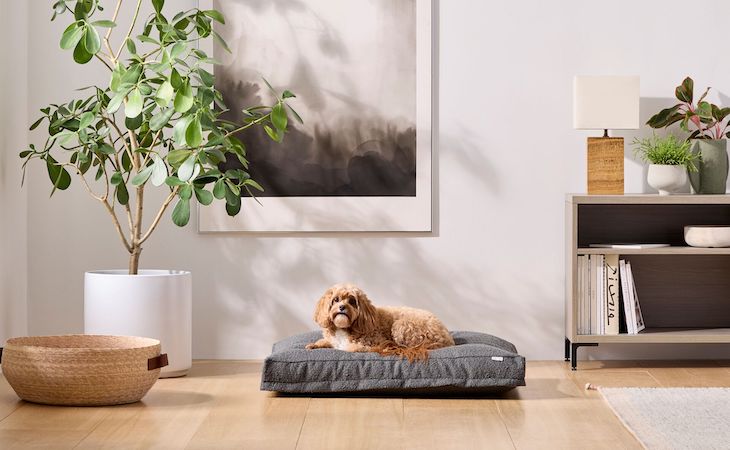Insomnia, the sleep disorder that can make it difficult to fall and stay asleep, is something that many people deal with. If you have pets, then you may have wondered, “Can dogs get insomnia? Do cats get insomnia?”
As it turns out, insomnia is a condition that isn’t just limited to humans. In fact, dogs and cats can have trouble sleeping too.
Ahead, we’ll explore whether dogs and cats can get insomnia and what you can do to help your furry friends sleep better.
Can dogs have insomnia?
So, do dogs get insomnia? Shannon Barrett, veterinarian, says yes, dogs can suffer from insomnia—though it’s less common in dogs than humans.
According to Barrett, these signs could mean your dog has insomnia:
- Restlessness
- Pacing
- Whining
- Barking during the night
- Jumping on and off your bed
- Seeming tired during the day despite ample opportunities to sleep
What causes insomnia in dogs?
Common causes of dog insomnia include anxiety, underlying medical conditions, and changes in routine, says Barrett.
“Dogs may have trouble sleeping due to separation anxiety, loud noises, a disrupted schedule, or discomfort from arthritis,” she adds.
Barrett goes on to further explain these causes:
- Pain: Our pets are no different than us. If they’re in pain, then they can have trouble sleeping. Therefore, anything that causes pain, such as arthritis, dental problems, or ear infections, can interfere with their ability to sleep.
- Anxiety and stress: Separation anxiety or fear of certain noises can lead to insomnia. Many dogs with thunderstorm or firework anxiety will find it hard to sleep when these occur. Regarding separation anxiety, dogs may not sleep well when pet parents go out of town, even if a pet sitter stays with them.
- Environmental factors: Pet parents should provide a comfortable area for their dogs to relax. If there’s too much light or noise in this sleeping area or they don’t have an overall comfortable place to sleep, they won’t have a good night’s sleep. It’s essential that they feel safe in this environment as well. In some cases, this means away from other pets and young children.
- Diet and exercise: Lack of exercise or a poor diet can affect sleep quality. Dogs need adequate mental and physical stimulation daily to help them sleep soundly. A diet that causes GI discomfort will lead to poor sleep quality.
Can cats have insomnia?
If dogs experience sleeplessness, can cats get insomnia?
“Cats can also experience insomnia,” Barrett says. “Like in dogs, it’s usually a sign of an underlying medical condition.” She adds that it can be harder to notice in cats since they tend to be more nocturnal than their canine counterparts.
Barrett lists the signs that your cat may have trouble sleeping, which include increased nighttime activity and vocalizations, restlessness, and sleepiness during the day.
“One of the first signs owners may notice is a loud yowling at night,” she says.
What causes insomnia in cats?
“Like dogs, underlying medical problems and environmental changes are the most common reasons for feline insomnia,” Barrett says. “Cats tend to be prone to disrupted sleep when their routine is changed or when they feel anxious about things like construction noise, visitors, or a new pet in the home. It takes much less to stress out our feline friends than it does dogs.”
Dr. Barrett details the potential causes of feline insomnia:
- Medical issues: Chronic conditions like hyperthyroidism, increased blood pressure, kidney disease, or neurological issues can all disrupt their sleep.
- Pain: Cats also suffer from arthritis, but it can be harder to notice than in dogs since we don’t usually take our cats for walks or engage them in games of fetch. Insomnia or restlessness may be the first sign of pain.
- Stress: Changes in environment or routine may lead to anxiety and insomnia. We’ve also seen it in cats and dogs if they’ve recently lost a human or furry companion. They grieve just like we do. They may roam at night looking for their lost friend. This usually gets better with time.
How to help your dog or cat sleep better
Barrett offers these tried-and-true tips to help your pet with insomnia sleep better:
- Stick to a regular sleep schedule and bedtime routine. Consistency can help relax pets and prepare them for sleep.
- Make sure your pet gets plenty of exercise and playtime during the day. It’s also essential to provide them with mental stimulation so their mind can rest. A tired pet will be more likely to sleep at night. Also, ways to stimulate your dog mentally include interactive toys you can fill with their favorite treats or food.
- For cats, ensure they’re getting enough stimulation during the day. This includes different types of toys, cat trees with different levels, and window ledges where they can watch birds. Keeping them stimulated during the day can help them sleep better at night.
- Provide a comfortable, quiet area away from noise and distractions for your pet to sleep. Having an enclosed, cozy bed can help cats and dogs feel secure. Ensure there’s no bright light. Most of our furry friends prefer a den-like setting when looking for their ideal sleeping spot.
- Once medical issues have been ruled out, you can consider calming supplements such as those that contain melatonin. However, never give any medications to your pet without first checking with your veterinarian.
- Try massage, brushing, or light stroking your pet before bed to help soothe them. A gentle, calming touch can help get them ready for sleep.
- If you’ve ensured your pet has a comfortable sleeping environment, has gotten plenty of exercise, and is on a routine yet they still have insomnia, then it’s time to consult your vet. They’ll want to rule out pain, illness, or disease as the underlying cause. Effective treatment depends on determining the reason for their sleep struggles.
For a vet appointment, Barrett shares a bonus tip: “It’s always helpful to video your pet’s behavior at night to show your veterinarian so we can see what you see at home,” she says. “Your pets will rarely show the same signs during the office visit.”
FAQs
How do I know if my dog has insomnia?
Your pup will display certain signs and symptoms, which Barrett says include restlessness, pacing, whining or barking during the night, jumping on and off your bed, and seeming tired during the day.
How can I help my dog with insomnia?
For insomnia in dogs, there are several things you can do to help. Adhere to a regular sleep schedule. Make sure your dog gets ample exercise and/or stimulation during the day. Make your dog’s sleeping spot quiet and cozy. Consider calming supplements. And if all else fails, make an appointment with your veterinarian.
What does it mean if your cat can’t sleep?
It means that your kitty might be dealing with an underlying condition, such as hypothyroidism, high blood pressure, pain, or stress caused by changes in environment or routine.
How can I help my cat with insomnia?
To ease the symptoms of cat insomnia, the approach is similar to that of a dog with insomnia. Make sure you both stick to a regular sleep schedule. Give your cat plenty of mental stimulation during the day. Provide a comfy bed. Stroke and massage your cat before bed. And see a veterinarian if nothing else works.
Help your pet get better sleep with Saatva
If you’d like to help your pet get better sleep, you can look to our

Saatva comfort & luxury, designed just for our furry friends
The cozy yet breathable surface makes it comfortable to sleep and the responsive micro-coils can help align their spines, which is particularly helpful if your pet has arthritis or another painful condition that can inhibit sleep.
And the good news? The bed isn’t just for pups—cats can snooze on the small size too!




